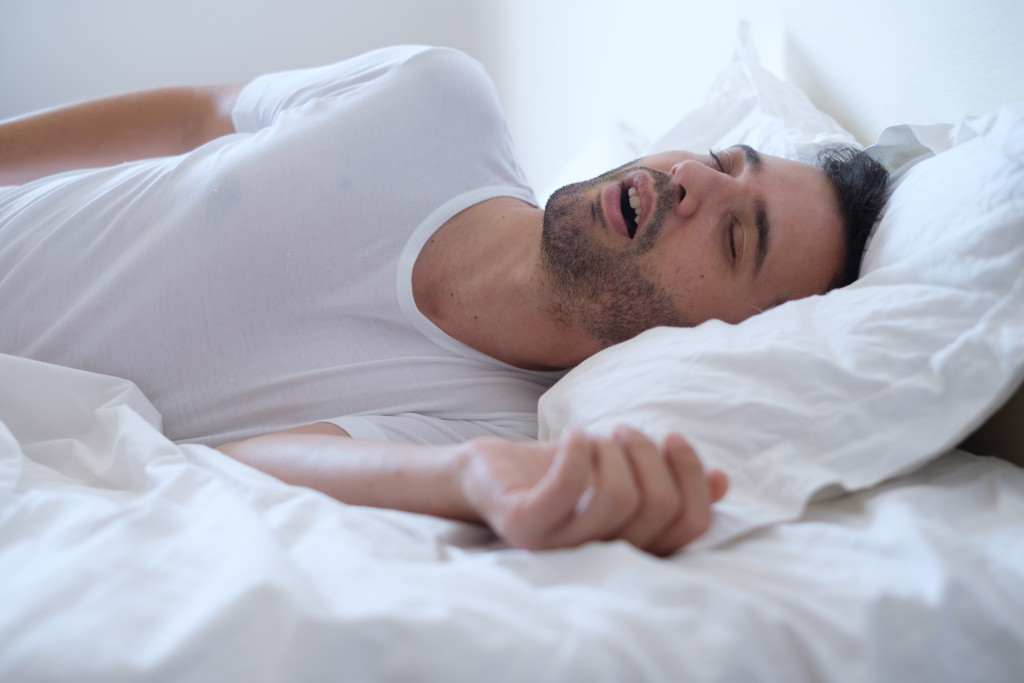Studies find that obstructive sleep disorders are more common for men than for women. The most common sleep disorder for men is sleep apnea. When you wake up in the middle of the night because your breathing pauses repeatedly, that is sleep apnea.
Sometimes, health experts characterize sleep apnea by shallow breathing instead of pauses. The pauses can last a few seconds, usually following loud snoring. Other than gasping for air, what wakes you up from sleep is when you choke or snort. It deprives you of quality sleep, and it can lead to significant health issues if left untreated.
Health Risks Associated with Sleep Apnea
Not many people know this, but sleep apnea can increase your risk for heart ailments. And the lack of quality sleep can lead to memory issues and weakened immune systems. Other sleep apnea symptoms include fatigue and headaches in the daytime, frequent urination at night, and dry mouth. Other than that, you should also look out for difficult concentration and memory problems.
You should immediately consult a doctor if you suspect that you suffer from sleep apnea. You will undergo various sleep tests to read brain activity and inspect nerve and heart signals. The doctor will also ask you about your sleeping patterns, medical history, and family history. Your physician will most likely recommend you to use continuous positive airway pressure treatment and other oral medication to keep the airway obstruction at bay.
Other than machine treatments, the doctors will advise you to make a few lifestyle changes. Here are a few lifestyle changes you can adopt to improve your sleep quality and mitigate the effects of sleep apnea:
1. Maintain a Healthy Weight
Obesity can increase the risk of airway obstruction, especially obesity in the upper body. Airway obstruction is what causes the shortness or pauses in breathing.
To reduce apnea symptoms, you have to be at a healthy weight. It is likely that when you reach and maintain a healthy weight, continuous airway treatments won’t be necessary. In other cases, sleep apnea goes away when the patient loses weight. But regaining the weight will also trigger sleep apnea back.
2. Avoid Alcohol and Smoking
Smoking is a risk factor for developing sleep apnea. So naturally, avoiding smoking will contribute to the treatment of your condition. Smoking can also cause inflammation in your airways. Inflammation in the airways blocks airflow.
Alcohol consumption affects the airways the same way. Alcohol causes a relaxing effect on the muscles that control breathing. This is why people who don’t have sleep apnea snore after a drink or two.
Sleep apnea, as mentioned, is caused by airway obstruction. It is not directly related to your caffeine consumption. However, controlling your coffee intake might also contribute to better quality sleep.
If you can’t let go of coffee, there are still ways to go around it. Make sure not to consume caffeine hours close to bedtime. Experts suggest drinking no coffee eight hours prior to your sleep schedule. Maybe, it will help to schedule your coffee at breakfast. You can also opt for decaffeinated coffee. You still have to be careful because some drinks are marketed as decaf despite having high caffeine content.
Did you know that changing your brewing method can reduce the amount of caffeine in your drink? If you brew your coffee at home, this is what you can do instead. Choose a french press or a coffee server with a filter brewer using lower-temperature water and brew it for a shorter time. This process produces a drink with less caffeine than machines and other methods do.
3. Practice Yoga

Yoga is a mindfulness activity. What you always do when you practice yoga is be aware of your breathing. This is why it can significantly help in improving your respiratory strength. Controlling your breath and doing slow movements in different positions will also encourage better airflow.
Sleep apnea is also often caused by decreased oxygen in your blood. Through breathing exercises, yoga helps improve blood oxygen saturation. This will result in fewer breathing interruptions when you sleep. Yoga is also beginner-friendly. You can enroll in a class, get one-on-one coaching, or watch videos online.
4. Change Your Sleeping Position
For children, breathing is normal when they are in a supine position or when they lay on their back. This is not the case for adults. When you suffer from apnea, it is better if you sleep on your side. If you find someone struggling in their sleep due to snoring, make them lay on their side. After a while, their breathing will be better.
Alternative Solutions for Sleep Apnea
Other treatments for sleep apnea include some oral appliances. Some of them help improve your condition by repositioning your tongue or jaw so that your airway will remain open as you sleep. You can get them over-the-counter or you can have them custom fit by a dentist.
Every person deserves a good night’s sleep. When you feel like you’re not getting enough sleep, chances are, you’re suffering from sleep apnea. Get yourself checked and change a few things about your life so you can improve your sleep and your overall health.

